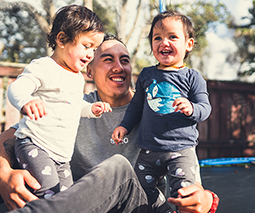Time out! 7 simple ways to minimise the sibling squabbles at your place

There’s a lot to love abut being a parent, but playing referee to your kids arguing has to be up there with the more challenging parts of raising kids. While it’s completely normal for siblings to be in conflict at times, helping them negotiate and move past disagreements can be exhausting and emotionally taxing for us parents. But if you intervene in a strategic way, as well as encourage your children to learn the art of compromise and problem solving, these suggestions might just halve your workload.
Here are seven tips for dealing with siblings fighting in your house:
1. Set up family rules
Rules or guidelines are helpful for setting clear boundaries and making sure the whole family agrees on them. This is your chance to tell them how you expect them to behave with each other, and make sure they understand where you’re coming from. Depending on the age of your kids, you can get them involved in coming up with their own family rules and make it a fun and bonding activity you can do together. List your rules on paper and make it a work of art before putting it up somewhere for everyone to see.
Read more about siblings here:
- Younger siblings teach older siblings empathy, says study – but there’s a catch
- 8 ways to prepare your child for a new sibling
- 16 books that are perfect for soon-to-be siblings
2. Know when to step in
It’s normal and even healthy for kids to bicker and conflict. It teaches them that people are different and relationships take compromise and work. Instead of stepping in right away, give them a bit of space to see if they can come up with an agreement on their own. However, if you can see it escalating or it becomes aggressive, step in to remind them of the family rules around conflict.
3. Acknowledge good behaviour
Your kids aren’t going to be fighting all the time, in fact there will be times when they treat each other beautifully. When you catch them sharing, playing together nicely, or using kind language towards each other, be sure to let them know you’ve noticed, and reward them with a compliment or praise – or use a sticker chart if you have one. Kids are more likely to repeat behaviours if they’ve been rewarded with attention for them.

4. Teach them how to get along
Children aren’t born with relationship skills, so it’s up to us to teach them what it takes to get along with other people. Part of this will mean demonstrating in your own interactions with others, whether that’s your partner, other family members or friends. When disagreements do crop up between your kids, use them as learning opportunities for trying to understand where each other is coming from, and how to reach a compromise.
5. Try to stick to routine
Routine is a great thing for a family, as it offers a sense of security and predictability, which go a long way in helping children feel settled and safe. It can also help children understand how things work in your household. For example, maybe you only have TV on for half an hour before dinner, or homework always has to be done right after school. When routines are consistent, it will reduce the chances of conflict because everyone will know how things are unfolding.
6. Coach them to problem solve
If your kids are constantly coming up to you to complain about their siblings, or to report an injustice of sorts, instead of solving their problems for them, try to coach them through the problem-solving process instead. For example, if two siblings are fighting over who gets to use a certain toy, ask them to list all the solutions they can think of and narrow down the list with them until they’ve come up with the best option.
7. Take care of you
You’re a human being – which means that if the fighting and arguments drive you a bit mad sometimes, it’s completely understandable. But this also means that it’s essential to take care of your own emotions in all of this, which comes down to making self-care a priority and knowing when you’re feeling pushed to your limits by your kids’ arguing. If you’re noticing that you’re not coping too well, or you’re tempted to respond aggressively, it might be time to get some help. Doing a parenting course or checking in with your GP could offer you some new strategies and give you the extra support you need to parent.









